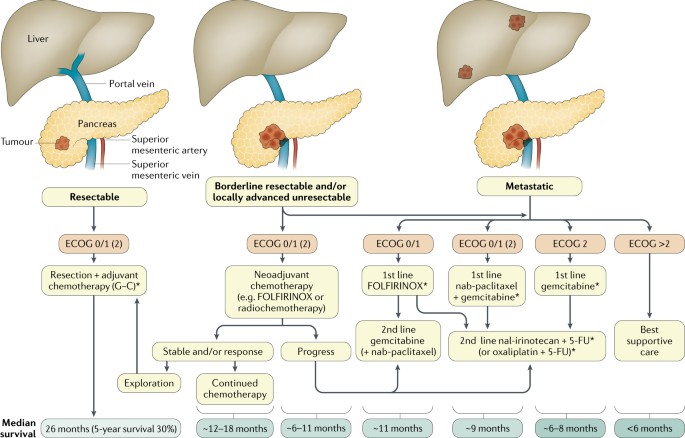
Pancreatic cancer is caused by cancerous cells growing out of control, forming what's called a pancreatic tumor. Pancreatic cancer is different from lung cancer in that it originates in the intestines. It can also be the result of cancerous tumors elsewhere in the body, but it's most often caused by an undiagnosed tumor in the pancreas. Smoking cigarettes: About one-third of pancreatic cancers are linked to smoking. Cigarette smoking can increase the risk of pancreatic cancer, particularly for those who have a family history of it.
Pancreatic cancer, in particular, can be very difficult to diagnose because the symptoms vary from person to person. These symptoms include weight loss, anemia, blood in the stool, jaundice, and an increased sensitivity to pain. Pancreatic cancer is also not contagious; only people with the disease themselves have any kind of risk of spreading it to others. Pancreatic cancer has no cure, although there are ways to treat it.
The first step in the treatment of pancreatic cancer is surgery. The surgery will either remove the whole tumor or a small part of it. Sometimes, if a part of the tumor is removed, the pancreatic cancer will stop growing. However, this is generally a temporary cure, since the tumor might have come back after the surgery.
Next, chemotherapy is usually given to kill the cancer cells and stop them from growing again. However, if the cancer cells are allowed to grow, the chances of it coming back are increased. Chemotherapy drugs work by preventing the cells from multiplying, which kills them off and prevents them from returning.
Chemotherapy drugs are also used to try to prevent pancreatic cancer from coming back. One type of drug that is used to prevent it from coming back is called a drug called temozolomide. Temozolomide is taken by mouth. When used, the drug binds with certain cancer cells in the liver and prevents them from multiplying.
Chemotherapy drugs may also be given to help in relieving the pain of people with pancreatic cancer. If the cancer is so advanced, surgery may be needed to remove a portion of the intestines. In some cases, the operation is done to repair a malfunctioning organ or to keep the stomach from moving. Another form of surgery is the removal of part of the intestine, which is called a palliative procedure. A person with pancreatic cancer usually can't eat solid foods.

Surgery and chemotherapy are the two treatments that are most often used for pancreatic cancer, because they are the most effective at treating the problem
However, if surgery and chemotherapy fail, pancreatic cancer may spread to other parts of the body or cause death. Surgery may be needed if the cancer is very advanced, although more common.
Treatment of pancreatic cancer can take a long time, sometimes many months or years, depending on the stage of it. The disease is still treatable, but it's best that it be detected early. Because pancreatic cancer can recur, doctors may have to treat the cancer for several times before it's fully cured. This is why it's important to get regular checkups and exams. And while a person with pancreatic cancer is still alive, they may be offered medications that will help them survive.
Some of the latest cancer treatments are using laser technology to treat pancreatic cancer. This is a kind of surgery that uses heat to kill cancer cells. This is often used on people who are very aggressive about their cancer. It's a fairly new method but is becoming popular because of its effectiveness. Doctors will use laser beams to target the cancer cells that are causing problems, instead of using chemotherapy drugs to destroy them.
There are a few different kinds of radiation therapy being used to help cure cancer. One type of radiation therapy, called brachytherapy, uses high-energy light to treat pancreatic cancer. Another, called external beam radiation therapy, uses radiation outside of the body. Radiation therapies are used in conjunction with surgery in cases where doctors cannot get to the cancer cells and kill them.
If you think you may have pancreatic cancer, talk to your doctor. They can give you information on all of the pancreatic cancer treatments that are available and tell you what options are available to you. Your doctor can determine what your treatment options are and what your prognosis might be.